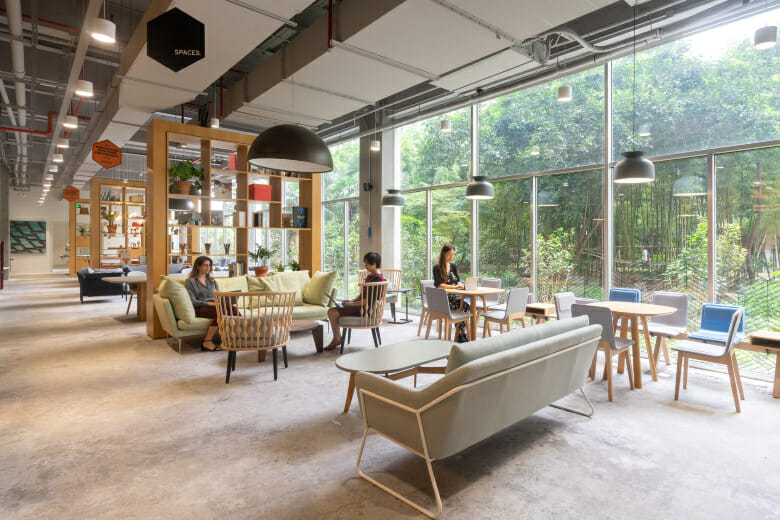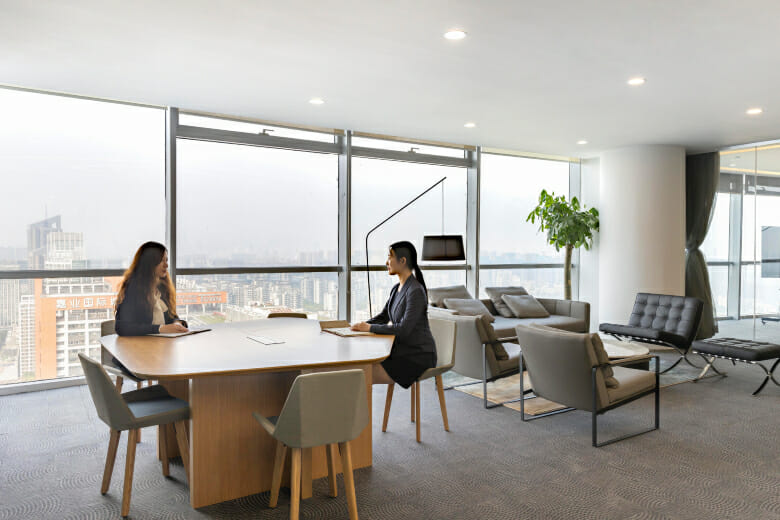How Flexible Office Partnerships Can Boost Occupancy in China

Regus Raffles City Changning, Shanghai
Average vacancy in Shanghai’s grade A office market reached 16.5 percent at the end of 2022, according to the most recent report from Cushman & Wakefield, with the broad range of choices available to occupiers putting pressure on landlords to find ways to fill more space and attract more business.
With uncertainty in the wake of the pandemic and rising interest rates causing many occupiers to avoid long-term lease agreements and big office fit-out bills, independent studies show that landlords can benefit from partnerships with flexible office operators which create new serviced spaces in their buildings and bring in fresh revenue streams.
“Many tenants are taking a wait and see approach regarding long-term leases, so providing a flexible office option can help to bring companies both large and small into attractive buildings,” said Yan Xiang, regional partnerships sales director for China at IWG. He added that, “Research has shown that there is a global shift toward space as a service, and IWG has been partnering with landlords worldwide to help provide the service that high value tenants are demanding.”
IWG, which ranks as the world’s largest flexible office operator with over 3,500 workspace locations globally under brands including Regus and Spaces, has seen this demand for partnerships help to propel continued growth. Even as other players in the industry struggle, IWG opened its 18th Hong Kong location just one year ago – a 6,020 square metre (64,800 square foot) whole building facility in Swire Properties’ 8 Queen’s Road East in Wan Chai.
From Space to Service
In explaining the appeal of Spaces 8QRE, which operates under IWG’s Spaces brand, Swire Properties director Don Taylor said, “IWG’s commitment to the entire 8QRE will help to boost the flex space offering to not only our Pacific Place tenants, but the greater business community as well. This reinforces our efforts to build a vibrant commercial hub, in and around Pacific Place, where people can thrive amid the rapidly evolving needs of those returning to work.”

Spaces Base Fuxing, Shanghai
Taylor’s thinking is echoed in a report shared at the MIPIM conference in Cannes, France last month by the Urban Land Institute and the Instant Group.
Based on a survey of landlords and occupiers from the ULI’s global membership, the report’s authors found that, “If a landlord can also provide flexible spaces around the core office, such as event spaces or meeting rooms, this will also allow tenants to get comfortable with locking in a longer lease.”
The ULI analysts added that, “Occupiers are willing to pay for these services (at the flexible office centre) if they can use them alongside smaller, better utilised private offices.”
Also among the major landlords in the region which are adding flexible space to their portfolios is Hongkong Land, which two years ago opened its “Centricity Flex” facility in its Landmark Edinburgh Tower in Hong Kong’s Central district, which occupies 25,000 square feet of space.
That space on the 17th and 18th floor of the grade A tower is now 90 percent occupied by tenants include US credit card provider Discover Financial Services, UK fund manager Toscafund and executive recruitment firm Argyll Scott.
In explaining the popularity of its flex offering, Paul Bennett, head of Centricity for Hongkong Land said, “Centricity Flex has proven extremely popular among existing and new clients.” He added that, “Long-term tenants in our portfolio use the facilities for corporate functions and short term space needs.”
Following a Hotel Model
Analysts at JLL point to partnerships with flexible office operators as an opportunity for landlords to diversify their income streams by working with experienced teams to attract more tenants as office demand gradually recovers from pandemic-induced shocks.
“Many smaller leases, especially those below 1,000 square meters, will eventually move to flexible leases,” Alex Colpaert, head of EMEA offices research at JLL said in a report last year. “Get it right, and landlords generate income from a much wider demand stream, often tapping into new and fast growing client groups,” he added.

Regus Sunny World Centre Nanjing, Jiangsu
With more space continuing to enter the market both in mainland China and in other major Asian markets, more landlords are turning to management partnerships that see the flexible office provider managing branded spaces with a property on a fee sharing basis.
“This office income model looks more like hotels than traditional office lease structures,” Ben Munn, managing director of flex space at JLL said in another study. “The income stream is variable with management agreements rather than fixed-rent leases.”
Under this model, the landlord takes responsibility for fitting out the space, but receives a greater share of the revenue than if the flex operator were leasing the space. This approach also offers lower risk than if the landlord leased the entire space to a single tenant, while the flex operator provides management expertise.
“Management agreements can also align landlords and operator incentives, creating a mutually-beneficial partnership for all parties,” JLL’s Munn said.
At IWG, we have spent 30 years refining and optimising our business model. As the world’s largest provider of flexible working solutions, we’re passionate about helping landlords and franchisees join the workspace revolution. Find out how we can support you today.
